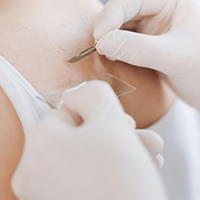
Australia has one of the highest rates of skin cancer in the world and at least 2 in 3 Australians will be diagnosed with skin cancer in their lifetime. Skin cancer is also one of the most preventable cancers through use of appropriate sun protection.
On this page you will find evidence-based resources developed by the Australasian College of Dermatologists to support our Fellows, other health professionals, patients and communities to make safe and wise decisions when it comes to prevention, early detection and diagnosis, treatment and management of skin cancer.
Skin cancer statements and factsheets


Read our position statement for information on the current evidence-based for population screening for melanoma in Australia.
Find out what skin cancer is and the most common types
Why using a combination of sun protection measures is important including how to use sunscreen safely and effectively.
Learn about skin cancer risk factors, warning signs and checking your own skin.
Know when to see a health professional and who to see.
Impact of skin cancer in Australia
More about skin cancer


Our A to Z of Skin resource provides detailed information on common skin conditions and problems, their symptoms, causes and how they are diagnosed and treated.
Find links to relevant skin cancer topics below
An overview of the most common types of skin cancer, the causes and how to prevent skin cancer.
Also known as solar keratoses or sunspots, actinic keratosis are pre-cancerous lesions that develop on sun-exposed areas of skin
Basal Cell Carcinoma (BCC) is the most common type of skin cancer and usually the least dangerous.
Bowen’s disease is a common superficial cancer of the skin most commonly appearing as a slow growing, red scaly patch on the skin.
Squamous Cell Carcinoma (SCC) is one of the most common forms of skin cancer.
Melanoma is a cancer that develops in the pigment cells of the skin and if not detected early, can spread to other parts of the body.
Merkel cell carcinoma is a very uncommon type of aggressive skin cancer.
Moles are normal overgrowths of pigment-producing cells called melanocytes. They can be a risk factor for developing melanoma.
Sun protection aims to reduce excessive exposure to ultraviolet radiation from the sun.
A skin biopsy is one of the most important tools in the diagnosis and management of skin diseases.
Finding support
Possible or confirmed diagnosis of skin cancer can be stressful. The following organisations provide practical and emotional support to people affected by skin cancer.
You can also visit our Help, helps resource hub to find more information on accessing care, patient support groups and support for your mental health and wellbeing, tips on talking to your doctor and preparing for your medical appointments and more.
Resources for health professionals

In this resource Australian dermatologists can find information on sentinel node biopsy (SNB), including its role in informing prognosis for patients with metastatic melanoma, which patients may be suitable and factors to consider in patient selection.


